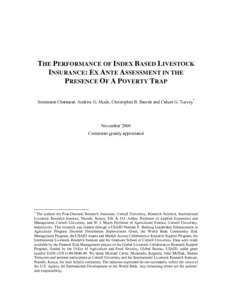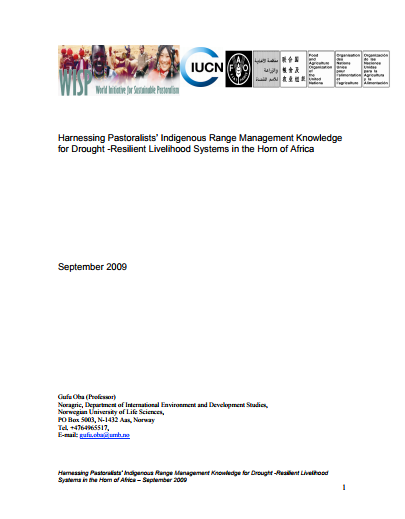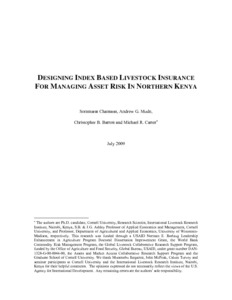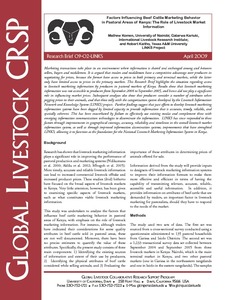Sustaining communities, livestock and wildlife in the Maasai Steppe: vital facts, observations and policy actions
The performance of index based livestock insurance: ex ante assessment in the presence of a poverty trap
This paper evaluates the effectiveness of a new index-based livestock insurance (IBLI)
product designed to compensate for area average predicted livestock mortality loss in
northern Kenya, where previous work has established the presence of poverty traps. We
simulate household-specific wealth dynamics based on a model parameterized using rich
panel and experimental data from the region. The simulations allow us to investigate
patterns of willingness to pay for asset index insurance that is imperfectly correlated with
The sedentarisation process of the Bahima in Uganda: an emic view
The traditional lifestyle of nomadic pastoralists is vanishing rapidly, because of human population growth which often leads to land scarcity or political pressure on pastoralists to settle. The sedentarisation of the Bahima pastoralists in Western Uganda started in the 1940s and is still going on. In this study former nomadic cattle keepers, who have settled with their families, were interviewed in order to document the decision to settle and the subsequent changes in the lifestyle of these people. All interviewees expressed their satisfaction with their sedentary life.
The linkages between land use change, land degradation and biodiversity across East Africa
Land use changes in East Africa have transformed land cover to farmlands, grazing lands, human settlements and urban centers at the expense of natural vegetation. These changes are associated with deforestation, biodiversity loss and land degradation. A synthesis of results of long term research by an interdisciplinary team reveals the linkages between land use change, biodiversity loss and land degradation. The results indicate that as native vegetation is lost, indigenous plant and animal biodiversity and plant cover are lost.
Harnessing Pastoralists’ Indigenous Range Management Knowledge for Drought -Resilient Livelihood Systems in the Horn of Africa
This report on harnessing pastoralists’ indigenous knowledge of rangeland management in three countries in East and the Horn of Africa is presented in two parts. The first part presents a review of the literature. The second presents the findings from the Orma in Tana River District of Kenya, the Afar in Amibara and Gawane Districts of the Afar Regional State in Ethiopia and the Karamojong in the Moroto District of Uganda.
Participatory investigation of relative incidence and impact on livelihoods of livestock diseases amongst the Turkana pastoralists in Kenya
Designing index based livestock insurance for managing asset risk in northern Kenya
This paper describes a novel effort at developing index-based insurance for locationaveraged livestock mortality as a means to fill an important void in the risk management instruments available to protect the main asset of pastoralists in the arid and semi-arid lands of Kenya, where insurance markets are effectively absent and uninsured risk exposure is a main cause of the existence of poverty traps.
Décentralization et Limites Foncièrs au Mali
Au Mali, au début des années 1990, la décentralisation fut d’abord un acte politique permettant de proposer une solution viable au problème de la rébellion touarègue.Ensuite, les aspirations aux idées occidentales démocratiques (pluralisme politique,liberté de la presse, etc.) d’une partie des élites urbaines ont rencontré les plans des occidentaux pour le développement de l’Afrique pour donner un système de décentralisation territoriale à la française, mais où la commune est composée d’un ensemble
Factors influencing beef cattle marketing behavior in pastoral areas of Kenya: the role of livestock market information
Marketing transactions take place in an environment where information is shared and exchanged among and between sellers, buyers and middlemen. It is argued that traders and middlemen have a competitive advantage over producers in negotiating for prices, because the former have access to prices in both primary and terminal markets, while the latter only have limited access to prices in the primary markets. This Research Brief highlights the situation regarding access to livestock marketing information by producers in pastoral markets of Kenya.






